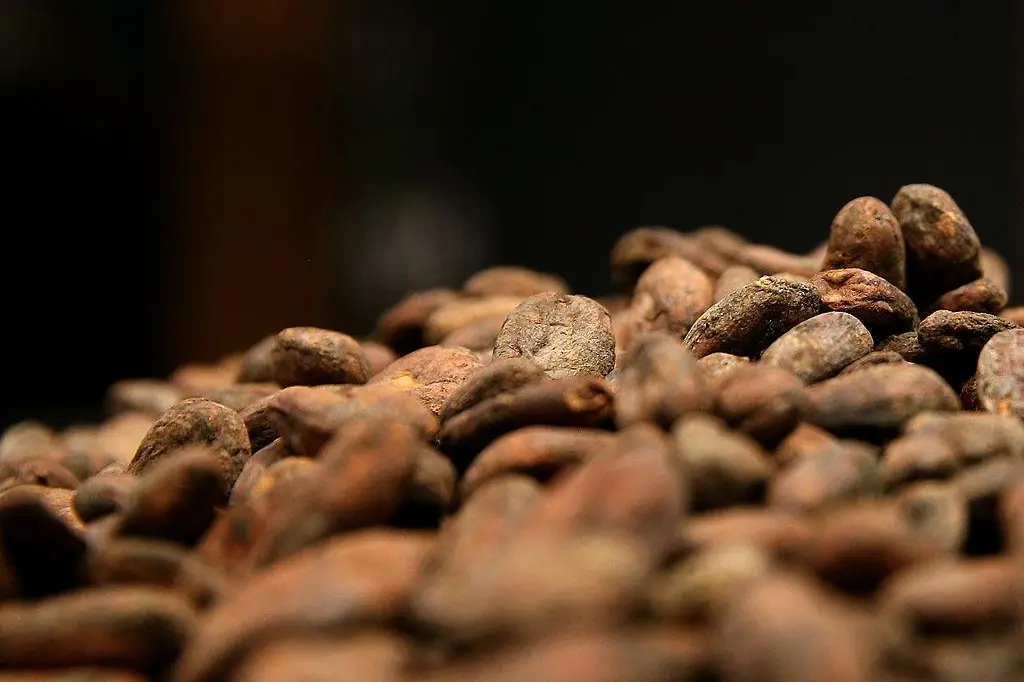PHOTO
The foreign plant is a new experiment for the Kingdom as it plans on testing out the long-term success of planting the favored sweet treat.
Specialists in the region pointed out that the cocoa shrub resembles the famous coffee shrub found in the south region of the Kingdom, where a number of farmers have already begun to evaluate the experience and continue cultivating land to make room for more, while others were not so successful.
The supervisor of the Mountain Areas Development and Reconstruction Authority in Jazan, Eng. Bandar Al-Fifi, said: “The cocoa shrub is a tropical or subtropical shrub and is native to South America and East Asia. It was presented to the Mountain Regions Development and Reconstruction Authority a few years back, specifically to the agricultural research station.”
He added: “The cultivation process was carried out six years ago by bringing seeds and seedlings from the Philippines. The seeds were cultivated and seedlings were distributed to some interested farmers in the region.
“We in the station’s field have cocoa, banana, mango and guava trees, as well as many tropical and subtropical trees. The field is being used as a guarantor of seeds, in addition to conducting tests and real experiments in an area of 200 meters, in particular on 15 cocoa plants and the first cocoa shrub in Saudi Arabia.”
He told Arab News that it was difficult at first to encourage farmers to invest in the plant, as many were hesitant to introduce a plant not indigenous to the region in order to facilitate the establishment of manufacturing factories and grow a local market.
Al-Fifi said that in Ethiopia, companies buy crops from farmers and then start an integrated industrial process of sorting, cleaning, drying and roasting, because to complete the whole process is not economically viable for farmers alone.
“If every farmer owns 30 cocoa shrubs, this will be an additional source of income for their future,” he added.
The Jazan region is known for its lush, green lands and fertile soil that possesses the necessary ingredients to ensure the development of other crops that guarantee continuity and different harvest times for each type of plant harvested in the area. Rainfall is abundant, seasonal fluctuations in rainfall are scarce and humidity is high, ensuring that soil continues to retain the moisture it requires for harvests.
“In addition to the fact that the temperature gap between small and mature shrubs is not big, due to our proximity to the equator, Saudi Arabia is located below the tropical line, which creates environmental conditions that help the shrub grow,” said Al-Fifi.
Gebran Al-Maliki, one of the owners of a cocoa plantation in Jazan, told Arab News: “Adding cocoa to the Kingdom’s agricultural field is one of the innovative things in Saudi Arabia and it began to give good results that would broadly stimulate the development process, provide an agricultural model that can be trusted and improve experience in a country that supports its farmers and provides them with all the required capabilities.”
He received seeds and seedlings by the end of 2016 as an experiment in which everyone was granted support. “Some wanted to give this new experience a try, because it is similar to the coffee plant. It is an ordinary shrub, just like fruit and citrus trees, but it is a drought-tolerant shrub that is watered once a week.”
To successfully cultivate the fruit, Al-Maliki said that shrubs need shade when first planted in the ground as they are “quite finicky,” but that with the proper care and attention, a tree will flower at about three to four years of age and can grow up to two meters in height.
With up to 400 seeds, the product testing began on his farm after just four years.
“You can find 30 to 50 seeds inside a pod, which are later dried under the sun and ground to become a ready-to-use powder. Cocoa powder can be found in chocolate, oils and cosmetics, in addition to several other uses,” Al-Maliki said.
He said that the seed is very bitter and explained that the more bitter, the better the quality. He added that he has four shrubs, and what hindered the spreading process was waiting for the product quality test results, indicating that the fruit was tried and was found very successful.
The agricultural research station for the Development and Reconstruction of Agricultural Areas aim to reach 50 shrubs in the region to provide enough fruit to produce seeds and seedlings for farmers. Al-Fifi said that they aim to reach 400 seedlings per year that will be distributed, on top of seedlings grown by the region’s farmers themselves.
Copyright: Arab News © 2020 All rights reserved. Provided by SyndiGate Media Inc. (Syndigate.info).





















